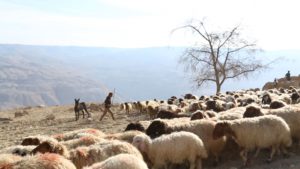Livestock Breeding
Some members of the Jordanian society are interested in raising various animals such as sheep, camels and cows, and all Jordanian tribes owned large herds of sheep and boasted among themselves of acquiring them.
Good sheep are selected and cared for in order to benefit from their meat, milk and wool, sheep can be raised in different climates, including the tropical climate. Most sheep farms are managed by a shepherd with a sheep dog. Most sheep farms build a fence, a dwelling, a place to mow wool, and there are other facilities for taking care of sheep, such as water, pasture, and a medicine center.
Farmers choose sheep of different suitable breeds depending on the region and market. When observing the estrus cycle of the ewe, the farmer organizes the meeting with the males. The tail of new lambs are usually amputated and the males are castrated.
In Jordan, there are large areas of pastures suitable for grazing sheep and livestock and rich in fodder materials, it was self-reliance in education, without relying on external or hired labor, such as grazing, milking, manufacturing milk products and wool, raising livestock such as cows, goats and sheep helps individuals and families earn a living by selling meat, dairy and other animal products, in addition to securing all food needs.
The aim of breeding them is to benefit from them in traveling and in work (such as plowing and transporting crops to farms), as well as to benefit from the products of these animals, such as dairy products from cows, sheep and camels. Milk, yogurt, butter and ice cream are made from them.


